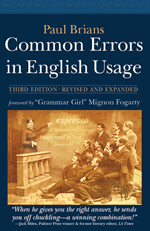that / which
yanira.vargasI must confess that I do not myself observe the distinction between “that” and “which.” Furthermore, there is little evidence that this distinction is or has ever been regularly made in past centuries by careful writers of English. However, a small but impassioned group of authorities has urged the distinction; so here is the information you will need to pacify them.
If you are defining something by distinguishing it from a larger class of which it is a member, use “that”: “I chose the lettuce that had the fewest wilted leaves.” When the general class is not being limited or defined in some way, then “which” is appropriate: “He made an iceberg Caesar salad, which didn’t taste quite right.” Note that “which” is normally preceded by a comma, but “that” is not.
Comments on this issue by Jack Lynch.
BUY THE BOOK!
